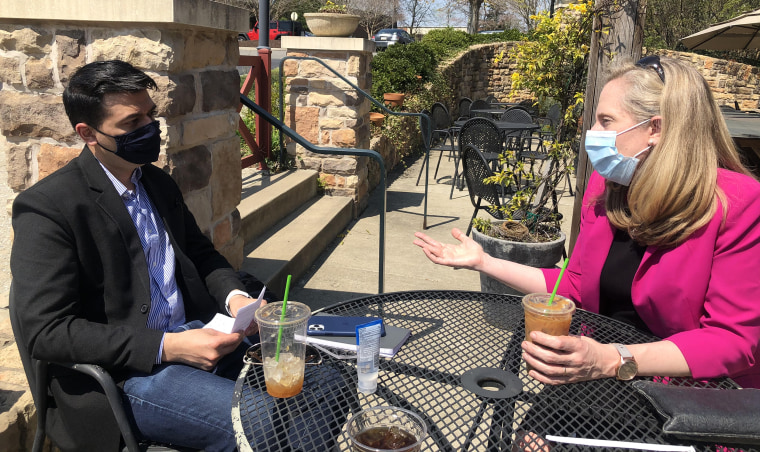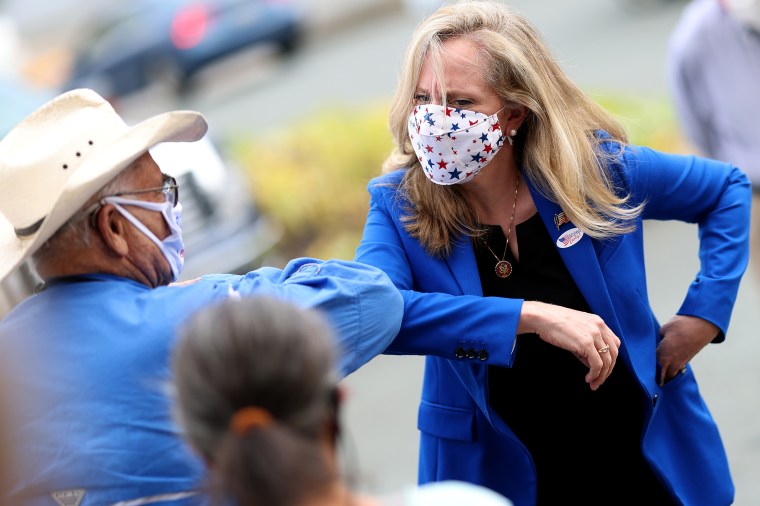NORTH CHESTERFIELD, Va. — Abigail Spanberger's congressional district, two hours outside Washington, has been a hot spot for political movements over the last decade, from the rise of the tea party to the "blue wave."
Now, in the time of President Joe Biden, temperatures appear to have cooled. Maybe it's a fleeting calm due to the receding Covid-19 pandemic and the improving economy.
"I'm seeing, gradually, the anxieties tamping down a little bit in the engagement that I'm having with people," Spanberger, a two-term Democrat, said in a wide-ranging interview at the Urban Farmhouse Market & Café outside Richmond. "And I can't ascribe that wholly to Biden — it's also Covid moving in the right direction, and people are starting to get their vaccine."
Democrats hope it's a harbinger of their ability to buck the historical trends and win the midterm elections as the party in charge. Spanberger's district has had an uncanny knack for reflecting the national mood, and both parties again see it as a key to the battle for House control next year.
She said that the reaction to Biden's $1.9 trillion economic stimulus has been "generally positive" and that she has experienced "wow" moments, such as when she told a superintendent what the school district would be getting. But she also warned of "negativity" about the high cost and confusion about what's in the law, which she said Democrats must keep explaining to voters.
"I won't call it backlash. I think there's a little bit of disappointment" about the party-line vote, she said. "But we're not getting much feedback in terms of 'I hate that, or you guys shouldn't have done this.'"
The moment is unlike the spring after the last two presidents took office.
In 2009, a swift backlash to President Barack Obama's stimulus plan triggered nationwide tea party protests, fueling a "shellacking" for Democrats in this district and others in 2010.
By this time in 2017, the national women's uprising had taken shape, as thousands of women filled the streets the day after President Donald Trump's inauguration, a movement that would fuel a Democratic "blue wave" in the 2018 elections.
So far, there hasn't been a grassroots uprising against the new president's agenda. And the stimulus doesn't appear likely to ignite one.

Democrats acknowledge that Spanberger's seat will be one of the most difficult to keep. Redrawn maps could affect the battle, but she said she expects the district to look largely the same.
Her re-election bid is a snapshot of the national fight. Republicans are banking on disaffected white and rural voters who turned out for Trump to stay engaged. Democrats hope that suburbanites who left the GOP in recent years will stick with their party and that a growing economy will minimize the backlash.
Democratic pollster Cornell Belcher said that Biden hasn't triggered partisan attitudes the same way Trump and Obama did and that his political capital can help Democrats if he spends it well.
"People are comfortable with 'Uncle Joe,'" he said.
They hope that keeps voters like Kara Floyd, an educator and supporter of Trump, from feeling too motivated. She said that she's "not a fan" of Spanberger and that she intends to vote for someone who opposes abortion and supports gun rights. But she's not unhappy about Biden's stimulus package.
"Of course, like every other American, I was really happy to get my stimulus check. It's going to pay for my vacation," Floyd said.
Fight for the suburbs
Republicans are banking on their ability to convince voters that Democrats are governing recklessly and don't deserve to hold on to power.
The National Republican Congressional Committee, or NRCC, puts Spanberger's district among the top 47 districts it wants to flip. The party doesn't have a candidate yet, and some operatives expect a competitive primary.
"Whether it's kowtowing to the teachers' unions or voting with the Democrats' socialist agenda, Abigail Spanberger will never put Virginians first, and it will cost her re-election in 2022," NRCC spokeswoman Camille Gallo said.
Spanberger wants her critics to define "socialism."
"The NRCC — they're going to say, 'Oh, she votes for a socialist agenda.' Well, what the heck is that? Vaccines?" she said. "That's not socialism. That's a functioning government."
Her district has swung sharply. It was the home of Eric Cantor, then the House Republican leader, when Republicans were known as the party of business and the suburbs. But voters delivered a shocking victory to right-wing populist Dave Brat in 2014.
"It has been a bellwether within the party and outside of that, as well," said Doug Heye, a veteran Republican strategist who worked for Cantor. "It's a Republican-leaning district, and Spanberger is the perfect Democrat for the district — but she's still a Democrat."
Spanberger, who was first elected in 2018, held on by just over 8,000 votes last year. She carried the booming Richmond suburbs and lost the rural areas stretching south from Culpeper for 100 miles.
"That is the change that should scare Republicans — the suburbs of Richmond. But the rest of the district is still very Republican," Heye said. "And that's the same conversation as Atlanta and Charlotte and Raleigh and Houston."
David Wasserman, House editor of the nonpartisan Cook Political Report, said Spanberger's race will reveal "a great deal" about whether the suburban shifts will persist.
"I expect it's a long-term realignment," Wasserman said, adding: "I'd say her prospects are very good. Surviving 2020 was tough, and the district's demographics and lines could both get bluer."
Trump-Spanberger voters
Of the big battle ahead in Congress, Spanberger said she's undecided about Biden's call to raise the corporate tax rate to 28 percent to finance a sprawling infrastructure and safety net proposal.
"My approach to lawmaking is I have to do a deep dive on everything," she said. "My obligation is to not just jump on board because the president says we want to do it."
Spanberger, 41, a former CIA officer, resists labels. Her political career in a divided district like this one hinges on defying caricatures of her party. She's eager to discuss noncontroversial issues that generate fewer headlines, like rural broadband.
She said Republican-leaning constituents voted for her and could do so again.
"It happened! Numbers-wise, I outperformed Biden in the district," she said. "I know there are people who voted for Trump and voted for me. The numbers reflect it, and I've heard it directly from voters."
Shortly after the election last year, Spanberger made headlines for her comments in a leaked caucus call, in which she blasted fellow Democrats who she said had fueled Republican attacks linking the party to "socialism" and the "defund the police" movement, which she said cost the party valuable House seats.
Spanberger stands by her criticisms. She said Democrats must think hard about "where we allowed ourselves to be reduced to something" they aren't.
"Some of it is that they launched really good attacks that really permeated," she said. "And we couldn't say they're just going to say bad things anyway, so just ignore it. No, there's a point in time where, if you don't tell people what you are for, the attacks that are made against you — if you don't answer it or you don't give a counter-discussion point, what else do people have to go off of?"
For Spanberger and the rest of the Democrats who hope to keep the temperature low among the opposition, sometimes that means embracing a low profile.
Isabella Davis, 22, a barista at the café Spanberger visited outside Richmond, acknowledged that she didn't recognize her congresswoman when she walked in. But she voted for her, and she expects to do so again in the fall.
"I just think she's doing a good job," she said.

